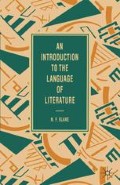Abstract
Since Aristotle’s time there have been books on the language of literature, and so one might wonder why another was needed now. To put this question into perspective one needs to consider it historically. In classical times the language of literature is encompassed in the concept of rhetoric. Originating in Greece as the art of composing a discourse for the law courts, it gradually came to embrace all linguistic expression, including literature. When applied to literature, rhetoric was based around the notion of genre, such as drama, history and lyric. Although rhetoric involved all aspects of composition, such as the choice of subject matter and its organisation, it came increasingly to be associated with various figures of speech which were used to embellish the subject matter of a given genre in an appropriate way. In the Middle Ages and Renaissance various handbooks on the art of composition for differing purposes were produced, and these usually contained long lists of figures and how they were best deployed. The idea of rhetoric is intimately related to the concept of the poet as a ‘maker’, as someone who can learn his or her art through study and application in much the same way as one could learn to become a doctor.
Preview
Unable to display preview. Download preview PDF.
Notes
Michael Cummings and Robert Simmons, The Language of Literature: A Stylistic Introduction to the Study of Literature (Oxford: Pergamon, 1983), p. xv.
Antony Easthope, Poetry as Discourse (London: Methuen, 1983), p. 8.
Roman Jakobson and Lawrence G. Jones, Shakespeare’s Verbal Art in Th’Expence of Spirit, De Proprietatibus Litterarum series practica 35 (The Hague: Mouton, 1970).
M.A.K. Halliday, ‘Linguistic Function and Literary Style: An Inquiry into the Language of William Golding’s “The Inheritors”’, in Donald C. Freeman (ed.), Essays in Modern Stylistics (London and New York: Methuen, 1981), pp. 325–60.
N. F. Blake, Traditional English Grammar and Beyond (Basingstoke: Macmillan, 1988).
Copyright information
© 1990 N. F. Blake
About this chapter
Cite this chapter
Blake, N.F. (1990). Introduction. In: An Introduction to the Language of Literature. The Language of Literature. Palgrave, London. https://doi.org/10.1007/978-1-349-21101-2_1
Download citation
DOI: https://doi.org/10.1007/978-1-349-21101-2_1
Publisher Name: Palgrave, London
Print ISBN: 978-0-333-45411-4
Online ISBN: 978-1-349-21101-2
eBook Packages: Palgrave Social & Cultural Studies CollectionSocial Sciences (R0)

